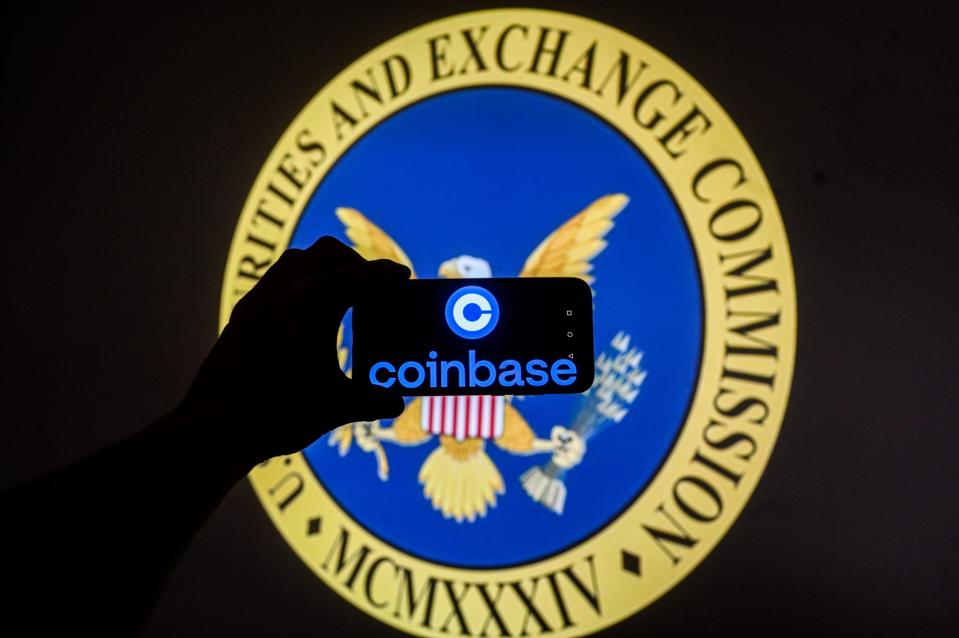Coinbase will get a judge to toss the SEC’s case, says one analyst—here’s why

The chances of a victory for Coinbase in its latest legal battle against the Securities and Exchange Commission are looking good, according to Bloomberg senior litigation analyst Elliott Stein, who predicts there’s a 70% chance that the regulator’s June 2023 lawsuit will be dismissed by the end of the second quarter.
“Coinbase had strong arguments on the SEC’s main claims,” Stein told Fortune.
The SEC's lawsuit alleges digital tokens offered by Coinbase, including Cardano and Solana, are unlicensed securities. If the agency prevails, it could poses an existential threat to the entire industry by requiring crypto exchanges treat digital tokens like stocks and bonds.
Coinbase has a different view of the securities issue. Purchasing tokens on the platform is like buying Beanie Babies, whereas purchasing securities is like buying shares of Beanie Babies Inc., Coinbase's attorney, William Savitt, told Judge Katherine Polk Failla at a hearing last week. Stein agrees with the analogy.
“The investment element, I think, is very different,” he said. “Coinbase definitely picked up on that.”
It’s a persuasive argument because it makes the distinction between primary and secondary market transactions, he added.
When purchasing securities on the primary market, a purchaser pays a company to build up their project in exchange for a reasonable expectation of profits. But Coinbase is arguing that as assets on their exchange aren’t directly from the issuer, trades are secondary market transactions.
Stein finds this distinction compelling. “You’re just buying an asset from somebody else,” he says, adding that because “you don't know what the issuers’ role is, or was,” buyers are not directly giving funds to a company. As a result, there can be no reasonable expectation of profits, and therefore assets fail under the Howey Test—the Supreme Court’s 1946 framework to determine if a transaction qualifies as an investment contract under securities regulation.
Stein’s prediction is also based on Failla’s ruling in Ripple’s SEC lawsuit, which found that the exchange’s native tokens, XRP, are not securities in some cases.
In that ruling “the judge found it problematic that purchasers on the public exchanges didn't know who was on the other side,” he told Fortune. In these types of transactions, there is no “meeting of minds” one would typically expect from a contractual relationship, he added.
“As the Ripple ruling in July suggested, sales of digital assets on public exchanges don’t fit neatly into the Howey test for what constitutes an investment contract,” Stein tweeted on Friday.
I went into SEC v. Coinbase hearing thinking $COIN would, on this motion, win dismissal of SEC's primary claims (concerning trading) but maybe not staking and broker claims. I left thinking COIN would win full dismissal. Snippet below and full note here: https://t.co/UfjiByMLzS https://t.co/7Y2Z93Nrwt pic.twitter.com/yLUUEwdVkl
— Elliott Z. Stein (@NYCStein) January 19, 2024
At last week’s hearing, Failla asked the SEC to defend why a digital token issuance would meet the Howey Test, arguing the agency's definition was “too broad.”
Patrick Costello, the SEC’s assistant chief litigation counsel, put forth the agency’s view that the tokens themselves are not a security—but that when customers buy them on exchanges like Coinbase, they’re investing in the network behind the tokens, creating an investment contract. “One cannot be separated from the other one,” he said.
While many legal onlookers share Stein’s vision of an overall Coinbase victory, they’ve voiced skepticism over an early dismissal.
“I watched the Judge carefully. She is either genuinely undecided about how to rule or she is a great actor,” James Murphy, founder of Ludlow Street Advisors LLC, tweeted on Friday. As in the Ripple case, he predicts that Failla will allow the case to go forward to discovery, a stance shared by Jeremy Hogan, a partner at Hogan & Hogan.
Attorney Dave Rodman told TechCrunch he thinks it’s “highly unlikely” that the judge dismisses the case outright. “This doesn’t mean that the SEC is right and Coinbase is wrong, it’s just that it’s rare for a judge to grant a motion to dismiss at this stage.”
This story was originally featured on Fortune.com

 Yahoo Finance
Yahoo Finance 